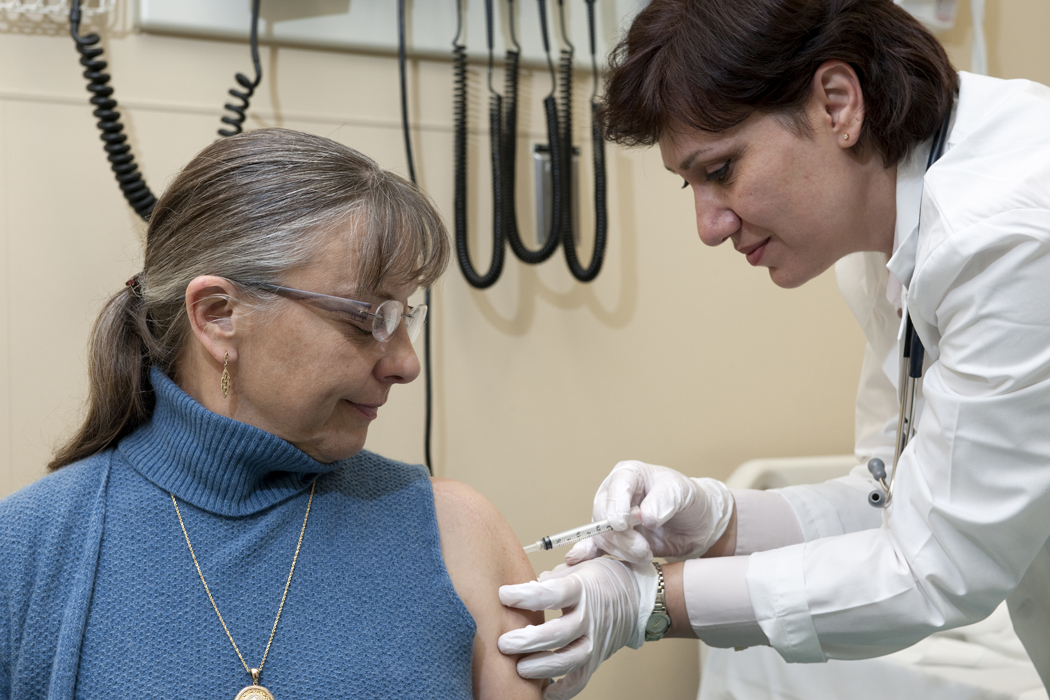
How the annual flu vaccine is developed
The following is a column by Salah Mahmud, an associate professor in the department of community health sciences at the University of Manitoba and Canada Research Chair in Vaccine Evaluation, wrote for the Winnipeg Free Press. It was originally published on October 24, 2014, A21. Dr. Mahmud is also a medical officer of health with the Winnipeg Regional Health Authority and Manitoba Health.
Influenza is a potentially deadly virus.
Each year, it infects 15 to 25 per cent of Manitoba’s population. Most people become sick for a period of a few days, but some will die from the infection.
Fortunately, there is a way to reduce your risk of contracting this virus. It’s called a flu shot, and it is one of the most effective ways of preventing influenza. Let me explain why.
The trick to combatting the flu is to develop a vaccine that contains dead virus that triggers your body’s immune system, allowing it to fight off the influenza infection.
But that is easier than it sounds.
When we talk about the “flu” we are actually referring to a virus that has many different strains. Influenza is really a disease of ducks, which can infect humans as well. As it shifts from species to species, it changes. Eventually, a new virus will emerge, like the H1N1 strain did in 2009, which was a mix of human, swine and bird viruses.
In order to develop an effective vaccination for the coming year, you not only have to know what strain of influenza was active last year, you also have to guess what strains may be circulating in the next year and then build that into the formula for your vaccine.
In order to do that, you need data. Plenty of data.
As it turns out, Manitoba is a contributor of data to the worldwide effort to fight the flu through its membership in Canada’s Surveillance Team Research on Influenza Vaccine Effectiveness (STRIVE).
STRIVE, which also includes health authorities in British Columba, Alberta, Ontario and Quebec, was created to keep tabs on the flu as it circulates throughout the country as well as the effectiveness of the vaccines that are created to combat the virus. The Manitoba STRIVE team is based at the University of Manitoba Vaccine and Drug Evaluation Centre and works with about 30 sentinel physicians and nurses in the community.
By getting vaccinated, you will reduce your risk of developing the flu by that much. That is a very good result considering the flu virus is constantly changing.
Patients who visit a sentinel clinician are asked if they are willing to take part in the study. If they agree, the clinician collects a sample to be tested for influenza and asks whether the person had the influenza vaccine.
This information is provided to the Winnipeg Regional Health Authority’s Population and Public Health and Manitoba Health surveillance teams, which combine the data with information from hospitals and laboratories to get a fairly good look at how people are being affected by the various strains of influenza circulating in the community.
The data collected by STRIVE is analyzed and sent to the World Health Organization, which gathers similar information from other countries around the globe.
Like weather forecasters giving us a seven-day outlook on whether it’s going to be sunny or cloudy next week, the WHO provides a best-chance outlook for the top three strains of the influenza virus expected to be the most problematic out of the thousands in the world.
This year, for example, the WHO has predicted the three strains of influenza posing the biggest threat will be the H1N1-California 7-2009 and H3N2 Texas 50-2012 types of A and the Massachusetts 2-2012 type of B virus.
It is through the efforts of these thousands of people around the world that drug manufacturers are able to produce a new flu vaccine every year. The work is paying off. On average, the flu vaccine is about 60 to 70 per cent effective. By getting vaccinated, you will reduce your risk of developing the flu by that much. That is a very good result considering the flu virus is constantly changing.
Of course, if you don’t get vaccinated, your chances of contracting the flu and ending up in bed sick go up significantly. So do yourself a favour and get vaccinated. It’s the best way to protect yourself and those around you from the flu.






